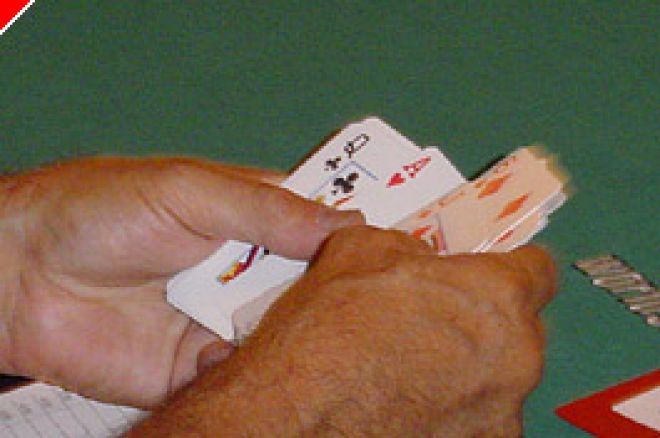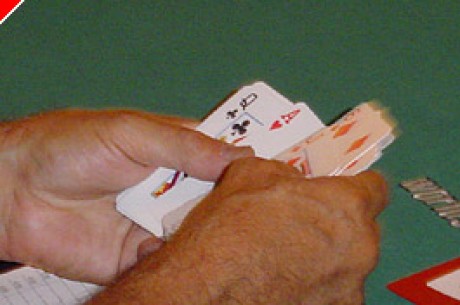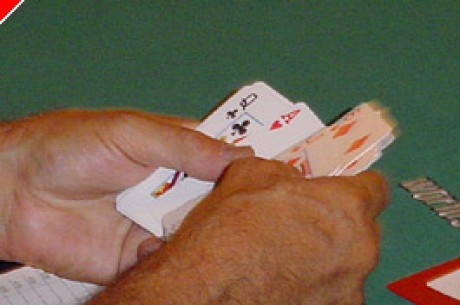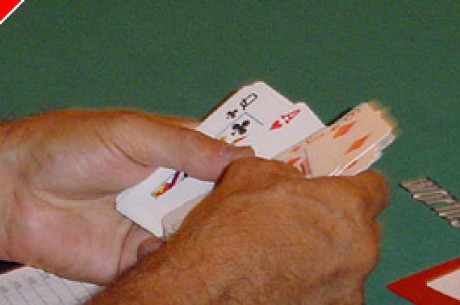Stud Poker Strategy - Death Spirals (final)

Let's recap our death spiral. We started with a good couple of hours of play, confounded by bad fortune and a drop of $200 from our original stack of $500. We compounded that unavoidable downward spiral with mistakes of inattention, anxiety and distraction - without getting up and clearing our head and refocusing our energies. We ended up in a nose dive after falling in love with our cards, neglecting to notice obvious signs that we were behind, and propelling ourselves ever downward with thoughtless aggression.
So now instead of being down to $300 of our original $500 as a product of the combination of good play and bad fortune, we are down to our remaining $90, down $410. We're also emotionally drained and physically exhausted after six hours of tough play and tough conditions. We should probably call it a night. And if we had a clear head we would. But we're tired and stuck - and our only concern right now is getting back to even - or losing it all.
We commit ourselves to playing very tightly - just waiting for the truly premium hands that we know we should play. But we really can't afford to lose another $500, and so we resist putting any more money in the game.
We're scared to lose, but determined to try and recoup our losses.
We dutifully fold the next seven hands - with junk. On the eight hand we are dealt a pair of 8s in the hole with a King kicker exposed. The 8s and Kings are fully live. But someone in front of us raises with an Ace. He is a very aggressive player. We can't afford to take him on so we fold.
A few hands later we're dealt a split pair of Jacks and an Ace kicker. We're in early position. We're nervous about raising, since we remember the fiasco of raising, getting re-raised by Kings and staying to the river only to lose a bundle. But we're not superstitious. We know that it's important to raise with a premium pair. So we raise. Three players call the raise and a wild player with King raises to $20. We remember what happened. We think about the fact that losing just one more fully contested hand would take all of our remaining chips, and so we fold - afraid of contesting the Ace.
This is an awful move - as we're getting great pot odds with all of the other players. We should probably reraise here - to knock out the callers and get their dead money in the pot and then go to the River with this maniac. But this low rung on the death spiral is filled with weak-tight disease. And so we concede lamely - just protecting our diminished bankroll enough to die a slow death.
And death does come. Our chips inch away in stolen antes - from players who are perceptive enough to notice our horrible weakness and tiredness and fear. They ante-steal us to death - until so low on chips and so unwilling to buy in again to have a competitive stack with a chance to maximize a win if a good hand does materializewe just reach a desperation point and decide that the $40 left isn't worth worrying about. We decide to just keep raising with junk in the hopes of getting lucky one last time with one miracle knock out blow.
So we raise with (8c4d)Kc. We get called by a player with a T. On the next card, which doesn't help either of us, we bet again and get called again. On Fifth Street we toss in our final $20 without even looking, so convinced we are of our own demise. Our opponent calls and tosses over his hand. He has a pair of Ts. Our hand doesn't improve. He ends up with Tens Up. We end up with (gulp) King high and lose it all - down $500 in a $10/20 game after seven hours.
At the moment we leave the table, crushed and tired and drained, we're just thinking about how the poker gods conspired against us. But we were the most significant factor in our own demise. What were those factors? Let me list them simply below. Paste them to your wall and memorize them. And then write them on an index card and take them with you to your next game. They're that important to consider.
1. When you are rattled by a difficult loss of any kind, do not stay at the table. Walk away until the rattling goes away and you can return refreshed and focused on the hand at hand - not the hand you lost. If you find that no matter what you do, you just can't shake the experience from your mind, then leave the game for the night.
2. Learn to give up on your ante-steals when they don't initially succeed. Sure, there will be times when continuing your bluff will win you the pot. But those are the exceptions.
3. When you are tired, leave the table. You will not have the discipline to play correctly nor the powers of observation necessary to take proper advantage of each situation.
4. Do not make "getting even" a goal. If you find that you are thinking about just getting even, that is a sign that you should stop playing. It will cut down on your ability to play aggressively when the situation calls for it.
5. You can't play good poker with scared money. Weak tight can be just as damaging to your bankroll as loose passive play.
6. If you're ready to just toss in your chips, don't. Toss them into your pocket and leave.
It is always better to leave when you are wounded rather than to play on until you die.
Ed note: Soft stud players at Ultimate Bet








